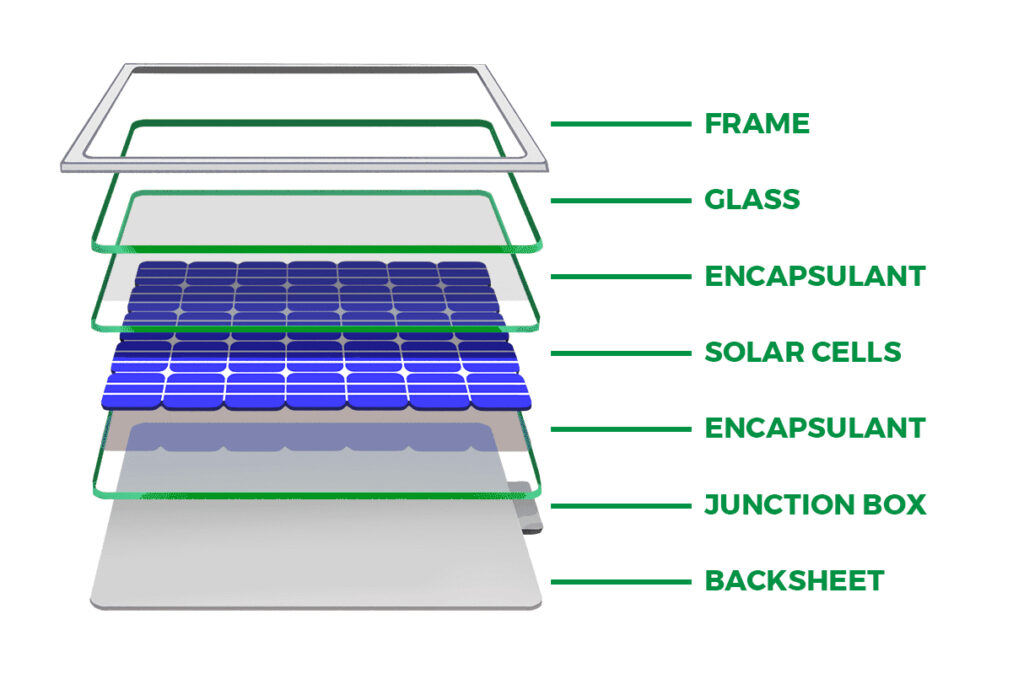Solar
The commonalities of raw materials, recycling processes, recycling challenges, and regulatory framework between electronics and solar panels uniquely positions PowerHouse Recycling as a high momentum, early pioneer in research and development in the up-and-coming solar panel recycling industry. PHR has recycled over one million pounds of solar panels, spanning multiple states, for large scale utility companies, solar installation contractors, and more.
Pioneer
Peace of Mind
Experienced
Pioneer
PHR is among early pioneers in solar panel (photovoltaic modules) recycling in the United States due to strategic partnerships and other longstanding business relationships formed through our electronics recycling services. Early, substantial investments in research and development, proprietary machinery, and established market separation systems has allowed PHR to successfully recycle solar panels at a much higher “percentage of panel rate” than other recyclers.
Peace of Mind
As a market leader in certified electronics recycling, PHR has decades of established internal compliance teams, certifications, best practices, and resources to handle high volumes of solar panels in step with the fast-changing technologies and in compliance of evolving regulations. Trusted by some of the largest utility, energy companies in the United States.
Experienced
PHR recycles over seventy-five million pounds of electronics through our campuses annually. In the solar panel recycling industry, which is in its infancy stages, PHR has already recycled over one million pounds of solar panels, spanning multiple states, for large scale utility companies, solar installation contractors, and more. PHR understands the problems and challenges with solar panel recycling, including but not limited to transportation of the large panels, solar farm staging and loading coordination, clean separation of commodities, and more.
Solar Panel Composition
There are two types of solar panels that are commonly seen in our recycling processes:

Silicon Solar Panels: Mono-crystalline and poly-crystalline
According to the US EPA, crystalline-silicon solar panels represent over 95% of solar panels sold today. PHR’s early solar panel recycling processes have seen mono and poly-crystalline solar panels comprise over 90% of our throughput.
- 90% of panel weight is glass panel, aluminum frame, silicon cells
- Small traces of copper, zinc, lead, silver, and tin
Thin-Film Solar
According to the US EPA, thin-film solar panels, and more specifically Cadmium Telluride panels (CdTe) are the second most common solar panel after Silicon panels. Ultra-thin, semiconductor layers are stacked on top of a base material, such as glass, plastic, or metal.
- 98% of CdTe panel weight is glass, polymer, and aluminum
- Small traces of cadmium, copper, zinc, tin and other metals.
Solar panel inverters and junction boxes contain items more easily recycled, and similar to generated output from our electronic recycling processes: circuit boards, copper wiring, plastics, and metals.
PHASE 2 of solar recycling
PHR is in our PHASE 2 of solar recycling, meaning, we can recycle over 90% of the entire panel. Glass, aluminum, and metals can be recycled and recovered. We are currently developing newer processing lines, technology, and partnerships to be strategically placed in the market with processed volume for silicon recovery when that technology becomes available.
Solar Panel Laws, Regulations, and Policies
Some states have enacted laws, regulations, policies, or initial research. PHR’s internal compliance team is constantly staying current in the changing landscape of solar panel waste classification, transportation regulations, and more. These states currently have some level of solar panel policy:
- California
- Hawaii
- New Jersey
- North Carolina
- Washington
Key PHR Services Often Used By Solar Agencies:
